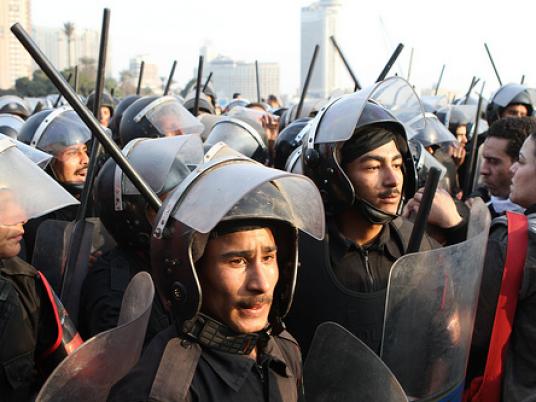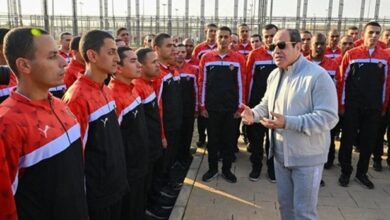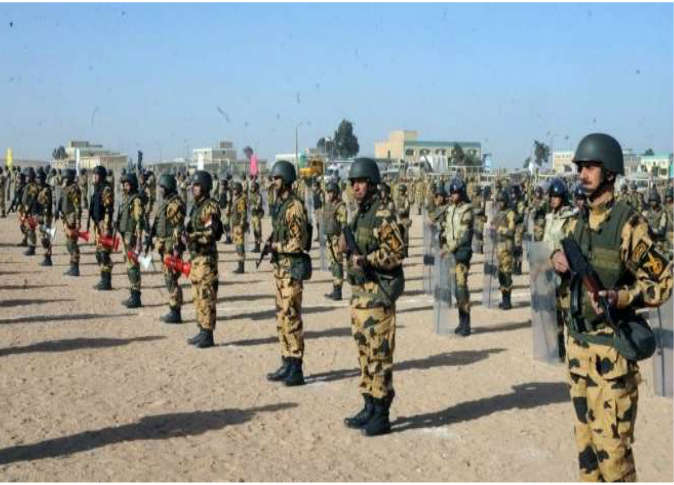
On the eve of 28 January 2011, the most deadly day of the 18-day uprising, a Central Security Forces (CSF) conscript, who asks to be referred to as Hossam to protect his identity, was nonchalant.
“My friends and I went out together in the lorry and we were laughing and joking. We thought it would just be a normal protest,” says the thin 22-year-old conscript, whose fingernails are chewed down to the quick.
By that evening Hossam was running for his life — in his underwear. Abandoned by their commanding officers and surrounded by hoards of angry protesters, Hossam and other recruits tore off their uniforms in an attempt to escape identification.
“My commanders, who always said to me, ‘Be a man, be a man’ ran away and left us,” Hossam said.
He eventually made his way home — before taking to the streets with his friends and joining protesters.
The mass protests of 2011 were the CSF’s first real test, and it failed abysmally.
Established in the late 1960s, the main function of the paramilitary force has been to intimidate the political opposition and silence public expressions of dissent.
A 1992 Human Rights Watch report says that the primary motivation behind the CSF’s formation was to relieve the army of the role of quashing the nascent political opposition to Gamal Abdel Nasser that emerged following Egypt’s defeat in the 1967 war. There had been a negative public reaction, the report says, to Nasser’s use of army troops on university campuses to put down student demonstrations.
In his “History of the Egyptian Intelligence Service,” Owen L. Sirrs describes Egypt’s State Security Intelligence Services as the regime’s “ears, eyes and interrogator” and the CSF as its “brute force.”
The CSF’s black-clad soldiers and its rumbling green lorries are found wherever dissent is — or expected. In Cairo, small CSF contingents are permanently deployed near demonstration hotspots downtown, drawn from one of the 10 CSF bases in Cairo and three in Giza. There are an additional three “special operations” bases in Greater Cairo.
Before 2011, it was virtually impossible for even tiny numbers of protesters to gather without them being quickly outnumbered — and frequently arrested or dispersed — by the CSF. They were used as a battering ram by the State Security Investigations officers, who exploited the extensive powers granted to them under the state of emergency continually in force since 1981 to silence protesters. The situation after the revolution has changed, with greater space for protest, although with several notable incidents of excessive violence by the CSF against protesters.
Toppled President Hosni Mubarak’s regime became increasingly dependent on using blunt force to silence critics as evidenced by the growth of CSF numbers. Initially composed of roughly 100,000 soldiers, by 1990 the CSF numbered some 300,000.
“The Interior Ministry didn’t work according to the law, it depended on people’s fear of it. In the absence of this fear [after the revolution] the Interior Ministry doesn’t know how to function,” a CSF officer who requested anonymity told Egypt Independent.
The soldiers
The CSF is composed of men called up for Egypt’s obligatory military service but who — usually because of a lack of educational qualifications or vocational skills — fail to make the cut for the army.
Hossam describes how at the army base he was summoned to for his first day of service, conscripts were separated with “educated people and people with a trade” sent to one side and “all the others” to the other.
“Every soldier hopes that he is posted to his home governorate,” Hossam said, explaining that recruits rely on their families for money to supplement their meager wage of around LE230 per month.
The CSF’s paramilitary nature is illustrated by the daily routine of its soldiers.
When not on duty outside the camp, they are woken up at 6:30 am and given what Hossam describes as an “awful” breakfast consisting of fava beans, bread, “inedible” cheese and tea. Soldiers are not allowed to bring food in from outside the camp “because of the risk of them hiding something inside it.” At 7:30 am, two hours of drill exercises begin until soldiers are given a break before the drills resume.
Hossam wistfully reminisced about his first foray outside the camp, to police a football match, 35 days after he was recruited.
“I was so happy because I was out of the camp and seeing people. Yes, people made fun of us and swore at us and threw bottles of water at us … but it was still beautiful. We didn’t have mobiles so we borrowed from the crowd and called our families. And at that time all my cohort of trainees was together. Now they’ve all gone to different places,” Hossam said.
Of all army conscripts, CSF soldiers are drawn from the most disadvantaged social backgrounds. With no recourse to justice, they endure incessant humiliation and abuse in already bleak living conditions, as well as the risk of violence — and boredom — during missions outside camps that often involve standing in one place for hours on end.
While Hossam says that he has never witnessed physical violence, he describes a regimen of insults, haranguing and belittlement of recruits that he suggests is necessary “to make men of them.”
Another CSF conscript, Ahmed, told Egypt Independent that soldiers are regularly beaten and mistreated by officers.
“It’s not bullying, they have to treat us harshly during drills,” Hossam said. “It’s a point of honor for them — they transform human beings… nobody can do anything to you because you have amazing strength. You know how to deal with people.”
The CSF officer claims that although there were some individual violations before the revolution “officers always received orders to treat soldiers well.”
“Where the Interior Ministry does fail is conscripts’ living standards,” the officer said.
Mohamed Mahfouz, a former police officer critical of the Interior Ministry who is now the assistant coordinator of lobby group “Officers but Honorable” says that harsh treatment of conscripts is an “essential element” of CSF training.
“We see the results of this in the street, in the soldiers’ viciousness,” Mahfouz said. “If we are going to deal with soldiers humanely, they shouldn’t be left in lorries like sardines in a can for eight or nine hours, nor be told that the protests are the reason they are having to endure these conditions. It is this that makes CSF soldiers violent against protesters.”
Compounding the problem is the absence of any kind of functioning mechanism for soldiers to seek redress for abuse.
“When a soldier makes a complaint against an officer he is regarded as being insubordinate,” Mahfouz said.
“If there is an official complaint to the Interior Ministry’s Inspectors’ Division, it is returned to the unit the complaint originates from for the unit itself to investigate. That enables the unit heads to discover who made the complaint and take revenge against him,” Mahfouz added.
A former Interior Ministry general told Human Rights Watch that CSF troops “are well-trained to punish people.” But, what toll does the regimen of violence and aggression CSF conscripts are subjected to take on their mental health?
Psychiatrist Mohamed al-Hamshary says that the inability of conscripts to respond to abuse by superiors puts them at risk of displacement, a psychological defense mechanism whereby an individual takes out anger or frustration on targets less threatening than the person who originally provoked his anger.
Sometimes, however, conscripts simply snap. In the rural hinterland of Nagaa Hammadi, a small town in Upper Egypt’s impoverished governorate of Qena, Egypt Independent met the family of Hassan Sharqawy.
Sharqawy died on 23 October, eight days after an operation to remove a bullet from his brain. His relatives claim that Sharqawy’s commanding officer Mahmoud Oraby shot the soldier through the roof of his mouth following an altercation in which Oraby insulted Sharqawy’s mother. There were, however, no witnesses to the incident, which took place at the Luxor CSF camp to which Sharqawy had been posted.
Sharqawy lost the ability to speak after the incident, but, before he died, an Al-Masry Al-Youm journalist recorded a video interview with him. She asks him where the officer shot him, and he gestures with two fingers, like a gun, in his mouth. From the video however, it isn’t clear that Sharqawy has understood the question.
David Nabil, the neurologist who treated Sharqawy in Luxor General Hospital, does not rule out the possibility that the soldier — who was facing trial for theft charges — shot himself. A source within the Luxor camp said that Oraby had been transferred to Cairo for questioning and was not available for comment.
Rebellion?
The most well-known example of CSF conscripts rebelling en masse was the mutiny of February 1986 when soldiers ran amok in the Haram area of Giza for two days before army soldiers were brought in.
The rebellion — which spread to CSF bases in six other governorates and led to the imposition of a curfew in Cairo — brought down Interior Minister Ahmed Rushdy and strengthened the army’s position, in particular that of Field Commander Mohamed Abo Ghazala, leading to Machiavellian rumors that, rather than being a spontaneous rebellion, this was a deliberate plot to undermine the Interior Ministry.
According to several sources, around 100 conscripts were killed as the rebellion was put down. A case filed against Mubarak by lawyer Shehata Mohamed Shehata alleges that CSF camps outside Cairo were bombed, leading to the death of thousands.
Prior to the revolution, documented incidents of rebellion by CSF soldiers were few. One took place on 11 November 2008 at the Mubarak Camp, when 600 soldiers broke windows inside the base and destroyed an officer’s room in protest at their treatment by superiors and particularly at rules forbidding them from wearing civilian clothing inside the camp.
CSF soldiers have grown increasingly restive however, with four documented incidents of rebellion since January 2011.
In May 2011, some 1,000 conscripts at the Al-Gabal al-Ahmar camp protested conditions, demanding that drills be lessened, periods of rest increased and that outstanding bonuses be paid.
Conscripts in a camp in Alexandria protested in July of the same year after an officer attacked a conscript. It was CSF officers’ turn themselves to protest in December 2011, when the officers objected to orders to go to North Sinai.
In May 2012, conscripts protested outside their camp in Obour, Cairo, after a soldier was allegedly beaten to death. The soldiers blocked traffic for two hours and the army was called in.
Karim Ennarah, a researcher with the Egyptian Initiative for Personal Rights, says that the Interior Ministry denied that a soldier died.
“The army said that it negotiated with the soldiers and that the issue had been resolved. I don’t think that negotiations happened because CSF soldiers are viewed as insignificant and not worth negotiating with,” Ennarah said.
Despite viewing them as worthless, the police and the army are extremely frightened of low ranking soldiers having any kind of voice, Ennarah says, because conscripts are “a double-edged sword; a threat if they rebel as they are hard to control.”
This view was echoed in 1986 by Ayman Nour. Writing in Al-Wafd newspaper after the rebellion, he described the CSF as a “ticking bomb.”
There was no significant reform of the CSF after 1986, which academic Robert Springborg, writing in 1989, attributed to the fact that “the military is strong enough politically to prevent its opponent from being upgraded and that the Ministry of Interior possesses enough clout to prevent the CSF from being disbanded.”
Nothing has changed even after the revolution, which exposed the CSF as truly a rabble of poorly trained, underpaid and put upon young men — a “slave army” as activist Hossam el-Hamalawy has described them — unable, or perhaps insufficiently motivated, to counter a real threat to the regime.
Mahfouz says that the CSF must be disbanded because there is no need for a force of a paramilitary nature to exist within the Interior Ministry.
He suggests that the CSF be replaced with rapid response units tasked with dealing with organized crime and narcotics offenses as well as protests.
The personnel making up these units — trained police officers and not army conscripts — must have orders to deal with protests in compliance with human rights standards, Mahfouz says. “They must be trained to protect protesters and deal with rioting using gradual and non-lethal force. The use of weapons must be a last solution, and only in self-defense.”
Mahfouz added that the absence of genuine monitoring of the Interior Ministry makes it difficult to learn the truth about crimes committed inside CSF camps, and achieve justice.
This article originally appeared in Egypt Independent's print edition.




